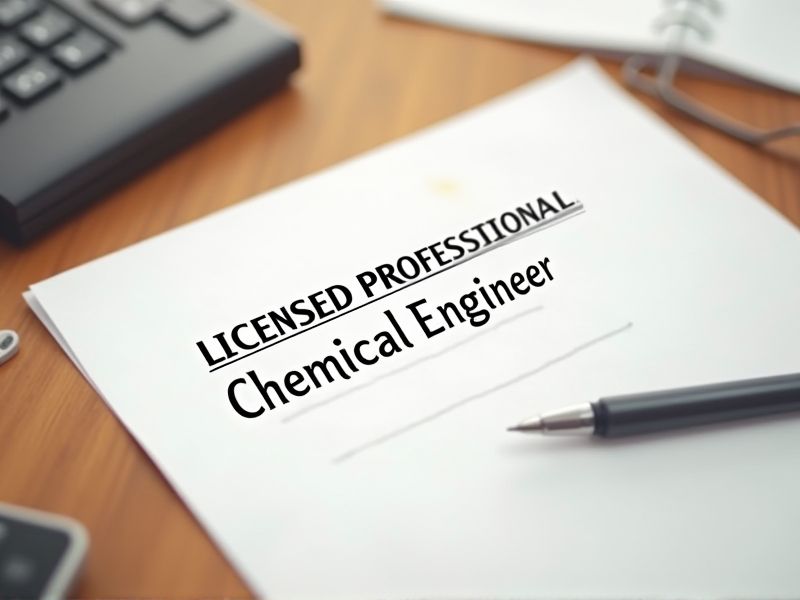
The field of chemical engineering is intricate, requiring professionals to adhere to stringent safety and environmental standards. Certain certifications validate a chemical engineer's expertise in specialized areas such as process safety and waste management. Earning these credentials bolsters one's expertise and enhances trust with employers and clients. Here are some essential certifications you might consider for a Licensed Professional Chemical Engineer.
Professional Engineer (PE) License in Chemical Engineering
Obtaining a Professional Engineer (PE) License is crucial for chemical engineers as it grants the legal authority to sign off on projects and ensures compliance with safety and industry standards. The license enhances credibility, making engineers more competitive in the job market, as many employers and clients prefer or require PE-certified individuals for critical tasks. Holding a PE License signifies a deep commitment to ethical engineering practices, as it's bound by legal and ethical codes that govern the profession. Extensive testing and prerequisites for the license reflect a confirmed mastery over core chemical engineering principles and practices.
Certified Safety Professional (CSP)
Statistical data indicates that incorporating risk management practices reduces workplace incidents in chemical engineering, necessitating the Certified Safety Professional (CSP) credential to bolster expertise. The CSP provides advanced knowledge in occupational safety, bridging gaps in safer chemical handling processes. Regulatory trends show increasing emphasis on safety compliance, underscoring the need for engineers to be safety-certified. Having a CSP can distinguish an engineer in a competitive job market, providing career advancement opportunities.
Certified Hazardous Materials Manager (CHMM)
The designation of Certified Hazardous Materials Manager (CHMM) equips a Licensed Professional Chemical Engineer with specialized knowledge to safely handle and dispose of hazardous materials, minimizing environmental risks. Expertise in regulatory compliance becomes essential, as CHMM certification ensures adherence to legal standards and environmental laws, critical for complex chemical projects. Effective hazardous materials management often leads to reduced operational costs and liability, benefiting organizations financially. Safety protocols established through CHMM training enhance workplace safety, consequently protecting personnel and public health.
Certified Process Safety Engineer (CPSE)
Certified Process Safety Engineer (CPSE) ensures a chemical engineer possesses specialized knowledge in process safety, directly impacting the reduction of workplace accidents and hazardous incidents. Acquisition of CPSE credentials often correlates with improved risk management strategies, resulting in safer operational environments and compliance with regulatory standards. Industries dealing with potentially dangerous chemical processes benefit from the integration of CPSE-certified professionals, as they apply rigorous safety protocols. Economic growth within the chemical sector often sees positive trends when process safety is prioritized, minimizing costly disruptions due to safety lapses.
Certified Environmental Professional (CEP)
A Certified Environmental Professional (CEP) provides essential expertise in navigating environmental regulations, which is crucial for Licensed Professional Chemical Engineers to ensure compliance in their projects. CEPs offer specialized knowledge in sustainability practices, aiding engineers in minimizing the environmental impact of chemical processes. This certification enhances credibility and trust with stakeholders concerned about environmental stewardship. It also enables engineers to implement innovative solutions that align with both industrial goals and environmental protection mandates.
Lean Six Sigma Black Belt (LSSBB)
A Licensed Professional Chemical Engineer benefits from Lean Six Sigma Black Belt training as it enhances their ability to improve process efficiencies and reduce waste in chemical manufacturing. Understanding LSSBB methodologies enables engineers to identify and mitigate defects in complex systems, leading to higher quality outcomes. Mastery of these techniques typically results in cost savings and optimal resource utilization. The strategic skills acquired align with industry demands for continuous improvement and innovation.
Project Management Professional (PMP)
Achieving the PMP certification equips a Licensed Professional Chemical Engineer with tools to manage complex projects efficiently, leading to better resource allocation and cost management. The structured framework of PMP enhances risk management capabilities, which is crucial in chemical engineering projects where safety and compliance are critical. PMP certification broadens their leadership and communication skills, facilitating effective collaboration with diverse teams and stakeholders. The credential can lead to career advancement and increased salary potential as it is globally recognized and valued.
Certified Energy Manager (CEM)
Licensed Professional Chemical Engineers may pursue the Certified Energy Manager (CEM) credential to enhance their expertise in energy efficiency, which can drive cost reductions in industrial operations. This certification equips engineers with specialized skills in energy auditing and management, addressing the growing demand for sustainable energy practices. Industry regulations increasingly favor professionals with verified energy management capabilities, positioning CEM holders as competitive candidates. Integration of chemical engineering with energy management principles facilitates innovation in designing processes that lower environmental impact.
HAZWOPER Certification
HAZWOPER Certification is needed for Licensed Professional Chemical Engineers because it ensures they are trained in handling hazardous substances safely, reducing the risk of workplace accidents. It enhances their ability to manage emergency situations and contribute to creating a safer work environment. Regulatory compliance requires such certification to adhere to OSHA standards, making it essential for legal and operational purposes. It expands professional opportunities by allowing engineers to work on projects involving hazardous waste operations.
OSHA 30-Hour Certification
The OSHA 30-Hour Certification enhances a chemical engineer's understanding of workplace safety, directly impacting the reduction of hazards in complex chemical processes. With a deeper grasp of safety standards, licensed engineers can design systems that proactively prevent accidents and ensure regulatory compliance. Through this certification, professionals can effectively lead safety training and emergency response, reinforcing a culture of safety within their teams. Employers value this certification as it signals a commitment to maintaining a safe work environment, which can also influence financial outcomes by reducing workplace accidents and associated costs.
Summary
When you, as a Licensed Professional Chemical Engineer, obtain additional certifications, you enhance your expertise and credibility in specialized areas. This increased proficiency can open doors to advanced career opportunities and higher earning potential. Organizations are more likely to trust and assign complex projects to certified professionals, boosting your career growth. Employers appreciate the commitment to continued education, which could lead to increased job stability and recognition in your field.
